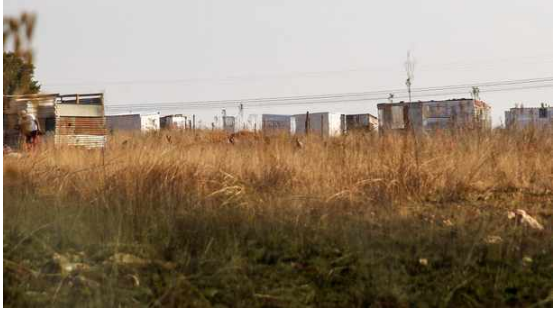Issued by Emma Louise Powell MP – DA Shadow Minister of Human Settlements
02 Oct 2022
The issue of orchestrated and illegal land grabs has become a crisis across South Africa, placing immense financial burdens on all major Metropolitan Municipalities and thousands of private land and property owners.
While land invasions have been a problem for many years, the start of the Covid-19 lockdown vastly accelerated the crisis, with an estimated R2.5 billion worth of property subsequently lost to invasions in Cape Town alone.
In the last two years, the City of Cape Town has responded to more than 14 500 land invasions, and cleared almost 180 000 pegs and structures. In the violent protests that have followed these operations, 80 officers have been injured, and more than 94 vehicles destroyed.
To illustrate the scale of the crisis, the Western Cape Department of Infrastructure spent in excess of R162.2 million last year on security preventing land invasions. In Cape Town, R142.8 million was spent on security costs.
For the 2020/21 financial year, the Western Cape Department of Human Settlements spent more than R 355,8 million to prevent illegal land invasions and the illegal occupation of completed units.
One month into the current financial year (2022/23), the department has already spent R12 306 350.00
Whilst the City of Cape Town’s Human Settlements Department spent more than 97% of its budget during the 2021/22 financial year, the rapid delivery of housing has become severely hampered by the scale of illegal invasions.
The City now has more than 800 Informal Settlements, many still requiring basic services that must be provisioned from grants administered by the national Department of Human Settlements.
Despite more than 350 000 residents waiting on the City of Cape Town’s database, more than 20 000 beneficiaries have been deprived of their rightful housing opportunity as a result of land invasions.
In the absence of any action being taken by the ANC to address the crisis of illegal land grabs, the DA has now submitted to Parliament a Private Members Amendment Bill to the Prevention of Illegal Eviction from Unlawful Occupation of Land Act 19 of 1998.
Unless the legislation that currently protects illegal land occupiers is challenged, the situation will continue to worsen.
The intention of the Amendment Bill is as follows:
– Create punitive measures for those who incite or promote orchestrated and unlawful invasions;
– Provide explicit criteria that must be satisfied during court proceedings prior to a municipality being ordered to provide alternative accommodation to illegal occupiers;
-Allow the courts to determine and limit the length of time alternative accommodation would need to be provided for an unlawful occupier;
– Compel the courts to explore the reasons for the invasion, as well as the maintenance obligations of the occupier’s family when considering judgement;
– Provide an explicit definition of what determines a ‘home’.
The DA has always been at the forefront of protecting property owner’s rights, whilst ensuring that the poorest and most vulnerable in our society are cared for by the State within its available resources.
We ask that members of the public express their support for the bill by telephoning their local radio stations, phoning their local MP’s, sharing information about the bill on social media, and submitting your comments to us at legislation@da.org.za.
DA to take decisive action on eviction laws in Parliament
Issued by Emma Louise Powell MP – DA Shadow Minister of Human Settlements
21 Aug 2022 in News
Note to Editors: Please find attached soundbite by Emma Louise Powell MP.
In the absence of any action being taken by the ANC to address the crisis of illegal land grabs, the DA will this week submit to Parliament a Private Members Amendment Bill to the Prevention of Illegal Eviction from Unlawful Occupation of Land Act 19 of 1998.
Sections 73 and 119 of the Constitution expressly provide individual Members of Parliament with the power to initiate legislation in Parliament.
The DA has always been at the forefront of protecting property owner’s rights, whilst ensuring that the poorest and most vulnerable in our society are cared for by the State within its available resources.
The issue of illegal land grabs has now become a major crisis across South Africa, placing an immense financial and logistical burden on all major Metropolitan Municipalities, as well as many private property owners.
The announcement of the national State of Disaster, and the moratorium placed on evictions, also led to a sharp spike in illegal property invasions across South Africa.
In addition to the prohibitive costs incurred by safeguarding land under development, municipalities are obliged to provide additional basic services to newly invaded land parcels that have not been provisioned for in statutory budget and planning processes. Money spent on private security and servicing costs means less resources are available to tackle the housing backlog.
The unlawful occupation of land also leads to severe dysfunctionality in cities, including the obstruction of sewerage infrastructure and access for upgrading and maintenance; pollution of waterways; safety hazards due to illegal electricity connections; the loss of rail reserves for trains to run safely; and loss of investment and value for property owners.
A shortage of amenities like clinics, schools and community centres close to invaded land places immense pressure on municipalities and surrounding communities.
Illegal land invasions also frequently result in violations of planning and environmental legislation, including the Subdivision of Agricultural Land Act, the Spatial Land Use Management Act, the Conservation of Agricultural Resources Act and numerous local by-laws.
In terms of the current law, where eviction orders are granted on both private and public property, government is frequently required to provide permanent accommodation to land and property grabbers who have been in illegal occupation for longer than 6 months.
This deprives law abiding South Africans, who are patiently waiting on the housing demand database, of their opportunities.
The intention of the Amendment Bill is as follows:
- Limit the application of the Act;
- Insert and amend certain definitions;
- Create punitive measures for those who incite, promote and participate in orchestrated and unlawful invasions;
- Provide explicit criteria that must be satisfied during court proceedings prior to a municipality being ordered to provide alternative accommodation;
- Allow the courts to determine the length of time alternative accommodation would need to be provided to an unlawful occupier;
- Compel the courts to explore additional reasons for the illegal occupation, as well as the maintenance obligations of the occupier’s family when considering judgement.
The only way that we are going to guard against the mounting crisis of land invasions, and the illegal occupation of private property, whilst at the same time safeguarding the rights of our poorest citizens, is to now amend the existing Act.
Earlier this year, the DA passed our first national Human Settlements Policy for implementation where we govern. This innovative and evidence based policy, based on international best practice, will go a long way towards addressing the housing crisis in South Africa. Land invasions are antithetical to this vision.
PARLIAMENT OF THE REPUBLIC OF SOUTH AFRICA
NOTICE 1267 OF 2022
MS EMMA POWELL, MP
NOTICE OF INTENTION TO INTRODUCE A PRIVATE MEMBERS BILL AND INVITATION FOR COMMENT ON THE DRAFT BILL, NAMELY THE PREVENTION OF ILLEGAL EVICTION FROM AND UNLAWFUL OCCUPATION OF LAND AMENDMENT BILL, 2022
Ms Emma Powell, MP, acting in accordance with section 73(2) of the Constitution of the Republic of South Africa, 1996, intends to introduce the Prevention of Illegal Eviction from and Unlawful Occupation of Land Amendment Bill, 2022 (the draft Bill”), in the National Assembly of Parliament. An explanatory summary of the draft Bill is hereby published in accordance with Rule 276(l)(c) of the Rules of the National Assembly.
The issue of orchestrated and illegal land grabs has become a crisis across South Africa, placing
immense financial and logistical burdens on all major Metropolitan Municipalities. The
announcement of the National State of Disaster, and the concomitant moratorium placed on
evictions, also led to a sharp spike in illegal land invasions across South Africa. Furthermore, due
to the costs incurred by safeguarding land, municipalities frequently need to provide additional
basic services to newly invaded land parcels that have not been provisioned for in statutory budget
and planning processes.
The unlawful occupation of land leads to severe dysfunctionality in cities, including obstruction
of sewerage infrastructure, safety hazards due to illegal electricity connections, violations to
planning and environmental legislation. The shortage of amenities like clinics and schools close
to invaded land parcels further places additional pressure on municipalities. Land invasions also
deprive law abiding South Africans of their state-subsidised housing opportunities.
Currently, the Prevention of Illegal Eviction from and Unlawful Occupation of Land Act, 1998
(Act No. 19 of 1998) (PIE Act) creates a rigid set of definitions and requirements that need to
be followed in order for a person to be lawfully evicted, despite their intentions or circumstances
during such illegal occupation.
In order for South Africa to create inclusive and well managed cities, the endemic of illegal land
invasions must be urgently addressed. Therefore, the application of the PIE Act needs to be
restricted in certain instances to prevent those unlawful occupiers, who have entered upon a
property in bad faith, from using the PIE Act as a defense or delay tactic at the cost of the owner
of the property.
The intention of the draft Bill is thus, inter alia, as follows:
• Limit the application of the PIE Act;
• Insert and amend certain definitions to give effect to these limitations;
• Create punitive measures for those who incite or promote orchestrated and unlawful
invasions;
• Provide explicit criteria that must be satisfied during court proceedings prior to a
municipality being ordered to provide alternative accommodation;
• Allow the courts to determine the length of time alternative accommodation would need to be provided for an unlawful occupier;
• Compel the courts to explore the reasons for the invasion, as well as the maintenance obligations of the occupier’s family when considering judgement.
The principles that give rise to this draft Bill have already been confirmed in notable court judgments where the courts specifically disapprove of any illegal land invasion.
This draft Bill does not intend to remove any rights of bona fide unlawful occupiers in terms of the PIE Act, nor does it intend to in any way negate a person’s right to housing in terms of Section 26 of the Constitution. The purpose of the draft Bill is to prevent those who, in bad faith, occupy a property or land without any legal entitlement to do so and rely on the provisions of the PIE Act to either stay on a property for as long as possible or to try and get fast tracked in the queue for low-cost housing projects.
Interested parties and institutions are invited to submit written representations on the proposed
content of the draft Bill to the Speaker of the National Assembly within 30 days of the publication
of this notice. Representations can be delivered to the Speaker, New Assembly Building,
Parliament Street, Cape Town; mailed to the Speaker at PO Box 15, Cape Town 8000; or e-mailed
to speaker@parliament.gov.za and copied to legislation@da.org.za.
Draft-Bill-2022-with-amendments-for-PLS
Views: 10

